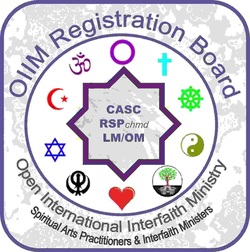Program Administration
Admission Standards
We have an open admission policy - that is you can enter at any time of the year. In addition to the following educational prerequisites, candidates for admission must have sound moral character, high ethical standards, maturity, academic aptitude, a commitment to the interfaith perspective and the desire to be of service through the ministry which embraces the inclusive message, ‘The Paths are Many, the Truth is One ... Love thy Neighbour!’
NTI reserves the right to admit or reject applicants at its sole discretion at any point in the admissions process. NTI is inclusive by nature and welcomes persons from all traditions, races, colours, ages, religious beliefs, challenges, national origin, sexual orientation or marital status.
Foundation Program CASC (Certificate of Applied Spiritual Counselling) - required for admittance to the upper level diploma programs.
A student accepted for enrollment into this program must:
(a) provide documentation of a high school diploma or its equivalency (GED), OR
(a-1) enter as a mature student by providing documentation of being over the age of 21, having not been in full time attendance at any school for at least 3 years ; and
(b) provide documentation through an essay as to one’s personal interest and background in the field, or
(b-1) provide documentation through an essay on how this course of study is perceived to accompany one’s current wellness or human service profession or if dedicating to the Ministry-why: and(c) have met the requirements laid out in the Graduation/Equivalency Booklet available as a PDF at www.InterfaithConnextions.org.
Upper Level Diploma Programs - Registered Spiritual Practitioners
Lay Minister (LM) and/or Registered Spiritual Practitioner specializing in:
A student accepted for enrollment into this program must:
(a) have completed the CASC program; and
(b) have met the requirements laid out in the Graduation/Equivalency Booklet available as a PDF at www.InterfaithConnextions.org.
OM (Ordained Interfaith Minster) and RSPd (Registered Spiritual Director)
A student accepted for enrollment into this program must:
(a) have completed the CASC program; and
(b) have met the requirements laid out in the Graduation/Equivalency Booklet available as a PDF at www.InterfaithConnextions.org; and
(c) dedicate themselves publicly at one of the intensive residencies and at a local OIIM Interfaith Celebration Service to be of service in an OIIM interfaith setting.
We have an open admission policy - that is you can enter at any time of the year. In addition to the following educational prerequisites, candidates for admission must have sound moral character, high ethical standards, maturity, academic aptitude, a commitment to the interfaith perspective and the desire to be of service through the ministry which embraces the inclusive message, ‘The Paths are Many, the Truth is One ... Love thy Neighbour!’
NTI reserves the right to admit or reject applicants at its sole discretion at any point in the admissions process. NTI is inclusive by nature and welcomes persons from all traditions, races, colours, ages, religious beliefs, challenges, national origin, sexual orientation or marital status.
Foundation Program CASC (Certificate of Applied Spiritual Counselling) - required for admittance to the upper level diploma programs.
A student accepted for enrollment into this program must:
(a) provide documentation of a high school diploma or its equivalency (GED), OR
(a-1) enter as a mature student by providing documentation of being over the age of 21, having not been in full time attendance at any school for at least 3 years ; and
(b) provide documentation through an essay as to one’s personal interest and background in the field, or
(b-1) provide documentation through an essay on how this course of study is perceived to accompany one’s current wellness or human service profession or if dedicating to the Ministry-why: and(c) have met the requirements laid out in the Graduation/Equivalency Booklet available as a PDF at www.InterfaithConnextions.org.
Upper Level Diploma Programs - Registered Spiritual Practitioners
Lay Minister (LM) and/or Registered Spiritual Practitioner specializing in:
- Spiritual Counselling (RSPc);
- Spiritual Healing (RSPh);
- Spiritual mediumship (RSPm) or
- Spiritual Direction (RSPd)
A student accepted for enrollment into this program must:
(a) have completed the CASC program; and
(b) have met the requirements laid out in the Graduation/Equivalency Booklet available as a PDF at www.InterfaithConnextions.org.
OM (Ordained Interfaith Minster) and RSPd (Registered Spiritual Director)
A student accepted for enrollment into this program must:
(a) have completed the CASC program; and
(b) have met the requirements laid out in the Graduation/Equivalency Booklet available as a PDF at www.InterfaithConnextions.org; and
(c) dedicate themselves publicly at one of the intensive residencies and at a local OIIM Interfaith Celebration Service to be of service in an OIIM interfaith setting.
Advanced Standing
Transfer credit may be awarded for post-secondary courses completed by the students at other Interfaith Ministry seminaries or other educational institutions, provided that such courses are found to meet NTI’s standards and the requirements of the specific course, at the sole discretion of NTI.
A maximum of one-half the total units required may be given through transfer credit. In both cases, the full practicum and internships, apprenticeship, tele-learnings and residency must be completed with NTI.
Students wishing to apply for transfer credit must have the issuing institution send official transcripts directly to NTI. We require a catalogue description of the course or a written description by the instructor, as well as a mark and progress report. After NTI’s initial determination of equivalent course credits, there will be a $10.00 evaluation fee for NTI to evaluate each credit transfer, whether as an appeal of this determination or because new courses have been taken simultaneously with NTI courses.
Transfering to Other Institutions
Other institutions may or may not accept transfer credit for subjects completed at NTI, depending on their particular policies. NTI will, upon your written request, provide for that institution an official transcript of your record at NTI. Should they wish a detailed description of the course, we suggest you provide them with your course outline and requirements. A fee of $20.00 per course will be charged should you want us to do that for you.
Confidentiality of Records
NTI respects the confidential nature of your records. We consider the following information about each student to be directory information: name, address, fax, e-mail address, telephone number, program enrolled in, date of enrollment. This directory will be released to anyone who asks for it, at NTI’s discretion, unless you specifically request in writing that we do not. No further information will be released without your written consent. We also recognize your right of access to your own records.
You must officially request to the Registrar all changes in personal and enrollment information. NTI maintains detailed school and student records for seven years. Transcripts will be kept for life.
Grading System
Essay assignments and thesis are evaluated on a numerical basis out of 100%. On official transcripts, NTI will state your mark and the Module average. If you need those marks translated into the A, B, C system, you can use the following schedule. Although NTI does not use the grade point system, grade point equivalents are given for purposes of comparison.
80% or above is required for successful completion of all subjects. Those choosing a specialization must also have a grade of 85% in courses relevant to area of specialization. (Major Core Subjects are considered to be more important to the interfaith ministry vocation.) A Module average must be 85%. Students who do not achieve an 85% in a module, may, at NTI's discretion, write an exam on that module.
Testing Procedures
Each course in NTI programs is self-contained. It may include textbooks, videotapes, audio tapes, notes, handouts and/or study aids. It will most often include questions and/or an essay assignment which are to be completed at the student’s convenience and sent by fax, mail or on-line to NTI. The NTI Registrar will ensure that the appropriate faculty member receives the assignment /essay for grading and evaluation. Always keep a copy in case of loss.
Certain modules must be completed before the 8 to 10 day intensive residency may be attended. A final examination will be administered during the retreat to those who do not have the 85% average on each module. All course assignments must be completed to NTI’s standards and all fees paid. NTI students are expected to observe a strict code of academic honesty.
Graduation Requirements
Graduation diplomas will be conferred at the conclusion of the residency. Confirmation depends on:
Freedom to Practice
A certificate or diploma from NTI or the Open International Interfaith Ministry® is not a license to practice. In most jurisdictions, spiritual counselling is an unregulated profession; no license or registration is required in order to practice under common law. Therefore we highly recommend that graduates work within the Ministry to members, followers or adherents, affording individuals the protection of OIIM’s registration process. NTI’s goal is to produce Interfaith Lay and Ordained Ministers and credible professional spiritual practitioners who will maintain their professional status through the registration process with the Open International Interfaith Ministry® . This process allows you to maintain your registration through obtaining 12 CEU’s (or 2 full day approved workshops) and submission of 5 on-going confidential evaluations every 3 years.
As a Lay Minister you can choose to dedicate as an Interfaith Minister and focus your apprenticeship in your upper level diploma program on ministering. As an Ordained Minister you will in most cases have the ability to be licensed as clergy within your province or state (this is a separate and distinct designation from the LM status that OIIM affords you on the path to OM). You will need to check the laws in your province or state, but normally within 2-5 years, you can become a licensed clergy able to perform weddings. This is advantageous because:
1) As a minister you are legally able to administer pastoral spiritual counselling to any parishioner, follower, adherent or member;
2) Spiritual Practices are a pastoral ministration of an Interfaith Minister and is therefore provided as a religious service;
and
3) A few jurisdictions have restricted the practice of psychic insights. In most jurisdictions, offering this service as a Minister as part of the individual’s (a member, follower, adherent or parishioner) religious beliefs is a right under freedom of religious practices.
Transfer credit may be awarded for post-secondary courses completed by the students at other Interfaith Ministry seminaries or other educational institutions, provided that such courses are found to meet NTI’s standards and the requirements of the specific course, at the sole discretion of NTI.
A maximum of one-half the total units required may be given through transfer credit. In both cases, the full practicum and internships, apprenticeship, tele-learnings and residency must be completed with NTI.
Students wishing to apply for transfer credit must have the issuing institution send official transcripts directly to NTI. We require a catalogue description of the course or a written description by the instructor, as well as a mark and progress report. After NTI’s initial determination of equivalent course credits, there will be a $10.00 evaluation fee for NTI to evaluate each credit transfer, whether as an appeal of this determination or because new courses have been taken simultaneously with NTI courses.
Transfering to Other Institutions
Other institutions may or may not accept transfer credit for subjects completed at NTI, depending on their particular policies. NTI will, upon your written request, provide for that institution an official transcript of your record at NTI. Should they wish a detailed description of the course, we suggest you provide them with your course outline and requirements. A fee of $20.00 per course will be charged should you want us to do that for you.
Confidentiality of Records
NTI respects the confidential nature of your records. We consider the following information about each student to be directory information: name, address, fax, e-mail address, telephone number, program enrolled in, date of enrollment. This directory will be released to anyone who asks for it, at NTI’s discretion, unless you specifically request in writing that we do not. No further information will be released without your written consent. We also recognize your right of access to your own records.
You must officially request to the Registrar all changes in personal and enrollment information. NTI maintains detailed school and student records for seven years. Transcripts will be kept for life.
Grading System
Essay assignments and thesis are evaluated on a numerical basis out of 100%. On official transcripts, NTI will state your mark and the Module average. If you need those marks translated into the A, B, C system, you can use the following schedule. Although NTI does not use the grade point system, grade point equivalents are given for purposes of comparison.
- A+ 95-100% Superior 4.5 gr. pt.
- A 90-94% Excellent 4.0 gr. pt.
- B+ 85-89% Very Good 3.5 gr. pt.
- B 80-84% Above Av. 3.0 gr. pt.
- C+ 75-79% Average 2.5 gr. pt.
- C 70-74% Low Average 2.0 gr. pt.
- D 60-69% Below Av. 1.0 gr. pt.
- F Below 59% No Pass 0.0 gr. pt.
80% or above is required for successful completion of all subjects. Those choosing a specialization must also have a grade of 85% in courses relevant to area of specialization. (Major Core Subjects are considered to be more important to the interfaith ministry vocation.) A Module average must be 85%. Students who do not achieve an 85% in a module, may, at NTI's discretion, write an exam on that module.
Testing Procedures
Each course in NTI programs is self-contained. It may include textbooks, videotapes, audio tapes, notes, handouts and/or study aids. It will most often include questions and/or an essay assignment which are to be completed at the student’s convenience and sent by fax, mail or on-line to NTI. The NTI Registrar will ensure that the appropriate faculty member receives the assignment /essay for grading and evaluation. Always keep a copy in case of loss.
Certain modules must be completed before the 8 to 10 day intensive residency may be attended. A final examination will be administered during the retreat to those who do not have the 85% average on each module. All course assignments must be completed to NTI’s standards and all fees paid. NTI students are expected to observe a strict code of academic honesty.
Graduation Requirements
Graduation diplomas will be conferred at the conclusion of the residency. Confirmation depends on:
- Achieving a 80% in all distance education courses in the program and an 85% average in each module.
- Attended 80% of the tele-learnings.
- Having attended and successfully fulfilled the requirements of the intensive residency.
- Making sure that NTI has received all confidential and sealed evaluations as part of practicums and apprenticeship.
- All program, tuition & book fees being paid in full.
- All requirements listed in the publication OIIM/NTI Graduation/Equivalency Requirements (posted at www.interfaithconnextions.org) have been completed.
Freedom to Practice
A certificate or diploma from NTI or the Open International Interfaith Ministry® is not a license to practice. In most jurisdictions, spiritual counselling is an unregulated profession; no license or registration is required in order to practice under common law. Therefore we highly recommend that graduates work within the Ministry to members, followers or adherents, affording individuals the protection of OIIM’s registration process. NTI’s goal is to produce Interfaith Lay and Ordained Ministers and credible professional spiritual practitioners who will maintain their professional status through the registration process with the Open International Interfaith Ministry® . This process allows you to maintain your registration through obtaining 12 CEU’s (or 2 full day approved workshops) and submission of 5 on-going confidential evaluations every 3 years.
As a Lay Minister you can choose to dedicate as an Interfaith Minister and focus your apprenticeship in your upper level diploma program on ministering. As an Ordained Minister you will in most cases have the ability to be licensed as clergy within your province or state (this is a separate and distinct designation from the LM status that OIIM affords you on the path to OM). You will need to check the laws in your province or state, but normally within 2-5 years, you can become a licensed clergy able to perform weddings. This is advantageous because:
1) As a minister you are legally able to administer pastoral spiritual counselling to any parishioner, follower, adherent or member;
2) Spiritual Practices are a pastoral ministration of an Interfaith Minister and is therefore provided as a religious service;
and
3) A few jurisdictions have restricted the practice of psychic insights. In most jurisdictions, offering this service as a Minister as part of the individual’s (a member, follower, adherent or parishioner) religious beliefs is a right under freedom of religious practices.



